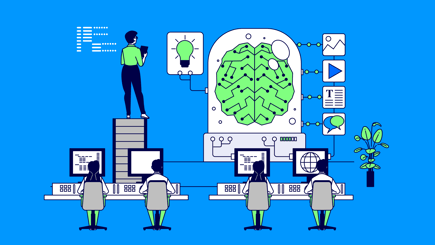
What is Digital Transformation and why should you adopt it?
The world is moving forward and digital transformation is gaining relevance in all sectors. Experts define it as the integration of digital technology across companies’ different departments, changing the way they operate and delivering value to its clients. It also entails a cultural change for organizations who are constantly experimenting and challenging the status quo.
As our undeniable star, digital transformation strives to rethink, reframe processes and re-execute strategies within an organization, leveraging the features and innovation that digital technology has to offer in order to simultaneously assess both how potential clients are being reached and how to meet their current needs.
As such, digital transformation calls for the assessment and reconsideration of most or all areas of an organization: supply and value chains, established workflows, worker skills, executive discussion procedures, interactions with clients and differential offers for those displaying special interest in the products and/or services.
As in the most successful TV shows, living at the edge and overcoming adversity are often the most thrilling scenes. In this case, digital transformation helps a company keep up with emerging demands from clients, thus staying relevant for the future. It also allows organizations to better compete in an economic environment that constantly changes as technology evolves. To that end, digital transformation is necessary for any business, non-profit or institution that wishes to survive in the market.
How does Digital Transformation affect companies?
As was mentioned above, Digital Transformation is not only about adding technology to an organization to stay up to date, but also integrating and aligning it in areas or processes requiring automatization or streamlining through specialized systems, thereby meeting the real needs of clients that have not been covered or attended.
That’s where another important player of this story comes in: data analytics, which has an important role. Data lets you study, get to know every client and solve the following questions: What do they want? What do they do? What do they think? What do they say? What habits do they have? What are my value differentors for meeting those needs? How should they be handled? What strategies should be created or developed?, among others.
This is key because clients will often claim that “The business was selling a lot and working well, but now sales are down and people aren’t interested in our supply”. Although this can be easily traced to economic contexts, that is not always the driving cause. This landscape must be analyzed: Is the client no longer interested in what they used to be?
Therefore, along with data, it is also important to analyze the strategy defined for facing demands and the effectiveness of processes applied for this generation, which will lead us to closely reassess another issue: Digital Culture.
This and other issues will be covered in the upcoming chapters. We invite you to follow the NetLabs series and get up to speed on relevant issues in digital transformation, technology and other factors for enabling the evolution of your business.






